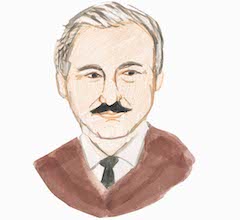
Haldun Taner (1915-86). A prominent Turkish playwright, short story writer, columnist, and academic. Born in Istanbul, Taner received a diverse education, studying economics and politics at the University of Heidelberg, German literature and philology at the University of Istanbul, and theater and philosophy at the University of Vienna.
Literary Career
Taner was a prolific writer, producing numerous short stories, essays, newspaper columns, travel writings, and plays. His writing style often incorporated humor and focused on social issues, reflecting the inconsistencies, hypocrisy, and cynicism of people from various walks of life.
Many of his short stories have been translated into several languages, including German, French, English, Russian, Greek, Slovenian, Swedish, and Hebrew.
Theatrical Contributions
Taner played a significant role in reforming Turkish theater. In 1967, he co-founded the Devekuşu Cabaret in Istanbul, where topical works were performed. He later established Bizim Tiyatro (“Our Theatre”) in 1969 and the Tef theatre group in 1978. His unique approach to playwriting involved combining improvisational elements with the traditional Turkish storytelling technique known as meddah.
Notable Works
Some of Taner’s most famous plays include:
- Keşanlı Ali Destanı (The Ballad of Ali of Keshan) – considered his most popular work
- Gözlerimi Kaparım, Vazifemi Yaparım (1964)
- Eşeğin Gölgesi (1965)
- Vatan Kurtaran Şaban (1967)
- Sersem Kocanın Kurnaz Karısı (1969)
Awards and Recognition
Taner received numerous awards for his literary contributions, including:
- New York Herald Tribune Story Contest First Prize (1954)
- Sait Faik Story Award (1954)
- International Festival of the Humor of Bordighera Award (1969)
Legacy
Haldun Taner‘s impact on Turkish literature and theater continues to be recognized:
- A theatre venue in the Kadıköy district of Istanbul is named in his honor.
- The International Organization of Turkic Culture declared 2015 as the Year of Haldun Taner.
Taner passed away May 7, 1986 in Istanbul due to a sudden heart attack. His contributions to Turkish literature and theatre have left a lasting legacy, influencing generations of writers and dramatists.